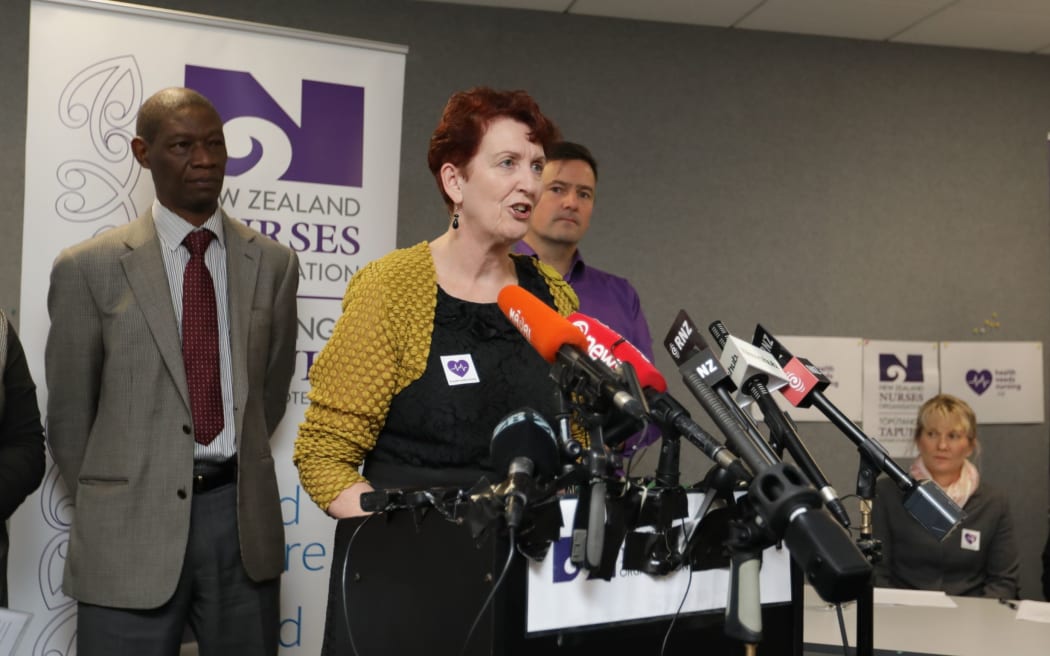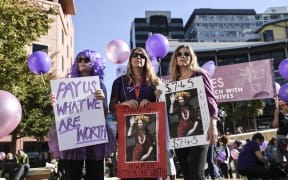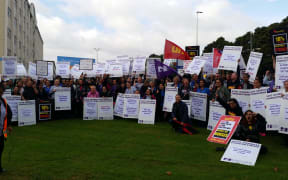Nurses have strongly rejected the new pay offer from district health boards (DHBs) after the nurses threatened to strike amid a staffing crisis.

NZNO industrial services manager Cee Payne talking about the decision today. Photo: RNZ / Rebekah Parsons-King
Last month DHBs offered nurses pay rises of 9 percent over the next 15 months in a bid to avoid nationwide strikes, with some eligible for a 15 percent increase.
The offer included a one-off payment of $2000, a 2 percent increase in staffing, as well as two new steps on the pay scale.
The new steps would mean registered nurses with more than five years of experience could have their base salaries boosted from $66,755 to $77,386 by December next year.
New Zealand Nurses Organisation (NZNO) Industrial Services manager Cee Payne said the 15 percent increase offer over three years was for registered nurses at the top of the scale, and for all of other union nurse members covered by MECA it was only a 3 percent per annum offer.
Ms Payne could not comment on figure for a pay rise that could satisfy the nurses' needs.
"We didn't give them a figure that would settle it ... but we talked about the figure of difference between a secondary teacher and a registered nurse at the top of the scale, and that gap equated to 11 percent."
"[The strike] will be successful in its own right ... in terms of whether it shifts the government or shifts the employers in terms of an offer we can only wait and see."
Ms Payne said strike action was on the cards if urgent mediation did not reach a satisfactory resolution for nurses.
"A very significant number have voted to take strike action but I'm sure there's a range of opinions just as there would be ... but the majority are very clear that they are committed to take strike action," Ms Payne said.
However, Ms Payne said the organisation was doing everything it could to reach a resolution that could possibly avoid strike action whilst satisfying both parties.
"We're going to do everything we can, every endeavour, to see if we can get an improved offer out of mediation ... we have an ability if we can have an improved offer that meets the satisfaction of our bargaining team to be able to conduct an online ballot in front of the 5 July."
"To avoid strike action it will take a resolution of the DHB MECA dispute that is satisfactory to our members."
NZNO chief executive Memo Musa said that strike action was a last resort but there were systems in place to ensure patient safety.
"Patient safety is paramount. We have had several meetings with DHB representatives to begin preparation to ensure patient safety," he said.
"NZNO will work with DHBs to agree provision of life preserving services and we will be absolutely comply with the Code of Good Faith for the public health sector."
She said an online survey had been sent to all members covered by the DHB MECA to clarify the issues that they require to be addressed to resolve the dispute.
Members will also participate in a campaign to share what they want as an outcome and ensure a safe and sustainable health system, Ms Payne said.
The precentage of ballots could not be revealed by the organisation but the results did show there was a high turnout.
"In fact, I think given the short period we had, that was probably historical high vote for NZNO, members are very keen to engaged in this dispute, they're not being passive, they're not sitting on the sidelines."
The strikes are scheduled for 5 and 12 July for 24 hours but DHBs have contingency plans in place and life-preserving services will continue.
Karen Marshall, who is both a registered and clinical nurse specialist, said she could understand why the latest offer was not adequate for some.
"I can see a lot of my senior nurses saying where's the respect for the value of clinical experience I've got the knowledge, skills and post-graduate qualifications," she said.
Nurses had become more passionate about fighting against their conditions and retaining more staff in the profession, she said.
"There's been quite an underfunding of health service, across all aspects including nurses for at least the last 10 years," Ms Marshall said.
"We've seen a huge loss in valued members … [who] leave to go overseas because of conditions of work and also their pay."
"They've realised that the time is now to take a better offer and to protect our public for the future … even though we're facing industrial action on 5 July, if we don't have nurses then the public will be more at risk."
Freya Head, one of the nurse delegates speaking at the press conference, said nurses were "disheartened", which made it difficult to accept offer.
"The estimated nurse salary is just not realistic for what our nurses will actually be getting, that made it hard for some nurses to accept the offer," Ms Head said.
She said nurses were standing together in unity for better outcomes for the health sector and that strike action was not being taken lightly.
"Nurses are becoming very active about making their voices heard … we're really committed to standing together and supporting each other to get a deal that shows our worth," she said.
Despite the risk of nurses striking, the DHBs say there is no extra money on the table to negotiate pay with the NZNO.





